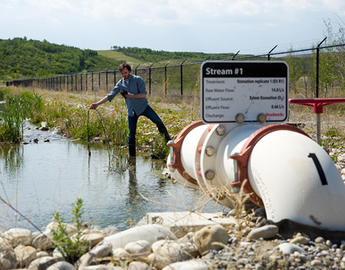
ACWA Reuse Beer
A partnership between UCalgary's Advancing Canadian Wastewater Assets (ACWA), Village Brewery and Xylem Inc. to make Alberta's first beer using treated wastewater
Sustainable water, sustaining beer
UCalgary’s Advancing Canadian Water Assets (ACWA) has partnered with Village Brewery and Xylem Inc. to produce Alberta’s first beer made with reused water, demonstrating how treated wastewater can help address water scarcity.
There’s a mental hurdle to get over of how inherently gross this could be. But we know that this water is safe, we know that this beer is safe, and we stand by our process.”
Jeremy McLaughlin
Head brewer, Village Brewery
What is water reuse?
Water reuse generally refers to the use of reclaimed water. Reusing wastewater as part of sustainable water management provides alternative water sources for human and environmental uses. By using new technologies to treat the existing wastewater more thoroughly, wastewater can be turned into a reliable and safe water supply for many uses.
The “Yuck Factor”
Emotional responses to water reuse are associated with uncertainty, even though our rational scientific understanding tells us it is no different than any other treated water. Can we overcome the “yuck factor” and make using reclaimed water into potable water acceptable? Singapore does. The space station does. Tell us – what do you think?
Is treated wastewater safe?
Yes. An advanced physical-chemical-biological treatment system was used, and monitored for optimal performance. The water used to make this beer met the pathogen reduction requirements and the Canadian Water Drinking Guidelines. An accredited laboratory tested the water after treatment to ensure independent verification of its quality.
Wastewater treatment plants disinfect water to remove pathogens, including viruses. SARS-CoV-2, which causes COVID-19, is an enveloped virus that research shows is particularly susceptible to disinfection.
Why is reusing water important?
Changing climate and growing global populations mean water authorities around the world are looking at treatment options to produce reclaimed water to meet declining fresh water supplies and achieve water security and sustainability. According to United Nations Water (UN-Water), reclaimed water may help address challenges associated with food production and industrial development. Advanced treatment to produce reclaimed water helps environmental sustainability and protects receiving waters from contaminants.
How was the water treated?
Municipal wastewater was treated in a full-scale Biological Nutrient Removal treatment plant, and then additional advanced treatment was done using ultrafiltration, followed by advanced oxidation (ozone + ultraviolet treatment), then reverse osmosis.
This multi-barrier process was monitored for the full duration of water production to ensure it met criteria specified by Alberta Health Services. Additional laboratory testing confirmed no presence of disinfection byproducts. Other jurisdictions have developed multi-barrier treatment approaches to similar water reuse projects, including Germany, Sweden, Singapore and the United States. This is the first project of this kind in Alberta, which allowed policy makers to test and verify a water reuse framework.
What brought you together for this project?
Water is essential to life and the focus of two of the United Nations Sustainable Development Goals. ACWA, Village Brewery and Xylem share an aligned innovation vision to help grow stronger, more resilient communities. Each of us has a connection to water and an opportunity to contribute.
Reuse Beer in the News



Calgary Herald
Village brews beer from wastewater as part of U of C sustainability project





